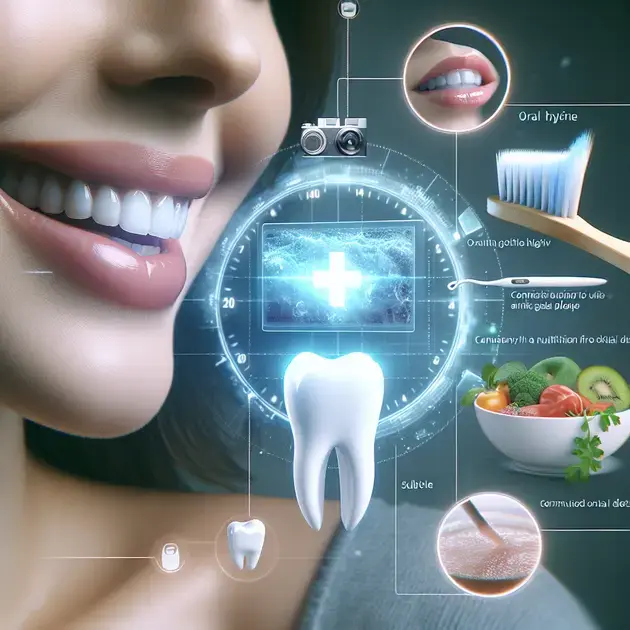Dental plaque is a common yet often underestimated issue that affects many individuals worldwide. Understanding the menace of dental plaque is crucial for maintaining good oral hygiene and preventing various dental problems.
Recent studies have shown that the accumulation of dental plaque not only leads to cavities and gum disease but also has been linked to more serious health conditions such as heart disease and diabetes. It is essential to educate oneself on the importance of proper oral care to combat the effects of dental plaque effectively.

The Impact of Dental Plaque on Oral Health
Dental plaque is a sticky film of bacteria that forms on the teeth and gums. If not properly removed through brushing and flossing, plaque can lead to various oral health issues. One of the primary impacts of dental plaque on oral health is the development of cavities. The bacteria in plaque produce acids that attack the enamel, causing decay over time.
Furthermore, plaque buildup can also result in gingivitis, which is the first stage of gum disease. Gingivitis causes inflammation and bleeding of the gums, and if left untreated, it can progress to more severe forms of periodontal disease. This highlights the importance of regular dental check-ups and professional cleanings to prevent the negative effects of plaque on oral health.
To combat the impact of dental plaque on oral health, it is crucial to establish a consistent oral hygiene routine. This includes brushing your teeth at least twice a day with fluoride toothpaste, flossing daily to remove plaque from between the teeth, and using mouthwash to help kill bacteria. Additionally, incorporating a balanced diet low in sugary foods can contribute to maintaining good oral health.
For more detailed information on the impact of dental plaque on oral health and tips for prevention, you can visit reputable dental health websites such as the American Dental Association (ADA) or the National Institute of Dental and Craniofacial Research (NIDCR).
Preventive Measures Against Dental Plaque
Preventing the formation of dental plaque is essential for maintaining optimal oral health. One of the most effective preventive measures against dental plaque is regular and thorough brushing of the teeth. Brushing your teeth at least twice a day with a soft-bristled toothbrush helps remove plaque and prevent its accumulation.
In addition to brushing, flossing daily is crucial for reaching the areas between the teeth where plaque tends to build up. Using dental floss or interdental brushes can help remove plaque and food particles that brushing alone may not reach. It is recommended to floss gently to avoid injuring the gums while effectively cleaning between the teeth.
Another preventive measure against dental plaque is using antibacterial mouthwash. Mouthwash can help reduce the amount of bacteria in the mouth, inhibiting the formation of plaque. Rinsing with mouthwash after brushing and flossing can provide an extra layer of protection against bacterial growth.
For comprehensive information on preventive measures against dental plaque, you can refer to oral health resources such as the Mayo Clinic website or the Centers for Disease Control and Prevention (CDC) dental health section.
The Link Between Dental Plaque and Overall Health
The presence of dental plaque not only impacts oral health but can also have systemic effects on overall health. Studies have shown a link between untreated dental plaque and an increased risk of certain health conditions, including cardiovascular disease and respiratory infections. The bacteria in dental plaque can enter the bloodstream through the gums, potentially causing inflammation and contributing to these health issues.
Maintaining good oral hygiene practices, such as regular brushing, flossing, and dental check-ups, is essential not only for oral health but also for overall well-being. By preventing the accumulation of dental plaque, individuals can reduce the risk of associated health complications and promote their overall health.
For more insights on the link between dental plaque and overall health, you can explore research articles from reputable sources like the Journal of Dental Research or attend seminars and webinars organized by leading dental associations.

Dental Plaque Removal Techniques
Dental plaque is a common issue that can lead to various oral health problems if not properly addressed. Fortunately, there are several effective techniques for removing dental plaque and maintaining a healthy smile. One of the most important methods is regular brushing and flossing. Brushing at least twice a day with a fluoride toothpaste helps remove plaque buildup on the teeth. Additionally, flossing daily is essential for cleaning between the teeth and along the gumline, where plaque often accumulates.
Another effective technique for plaque removal is using an antiseptic mouthwash. Mouthwashes containing ingredients such as chlorhexidine or cetylpyridinium chloride can help reduce plaque and prevent gum disease. It’s important to use the mouthwash as directed for optimal results. Additionally, incorporating an antibacterial mouthwash into your oral hygiene routine can provide extra protection against plaque buildup.
Professional dental cleanings are vital for removing stubborn plaque and tartar that may be difficult to eliminate with regular brushing and flossing. Dentists use specialized tools to scrape away plaque and tartar from the teeth, promoting overall oral health. Visiting your dentist for regular cleanings and check-ups is crucial for preventing plaque-related issues such as cavities and gum disease.
Electric toothbrushes are also excellent tools for plaque removal. These devices are designed to provide a thorough cleaning by oscillating or rotating the brush head, effectively removing plaque from the teeth and gums. Using an electric toothbrush can be particularly beneficial for individuals with braces or other dental appliances that make plaque removal challenging.
In addition to these techniques, incorporating a healthy diet rich in fruits and vegetables can support oral hygiene. Crunchy fruits and vegetables like apples and carrots can help clean the teeth and remove plaque. Drinking plenty of water throughout the day also aids in washing away food particles and reducing plaque formation.
Understanding the Importance of Regular Dental Check-Ups
Regular dental check-ups are essential for maintaining good oral health and preventing dental issues. During a dental check-up, your dentist will conduct a thorough examination of your teeth and gums to identify any potential problems. Early detection of issues such as cavities, gum disease, and oral cancer is crucial for timely intervention and treatment.
In addition to examining your oral health, dentists also perform professional cleanings during check-ups to remove plaque and tartar buildup. Even with regular brushing and flossing, plaque can harden into tartar over time, which can only be removed by a dental professional. Professional cleanings help prevent gum disease and other oral health problems.
Regular dental check-ups also provide an opportunity for your dentist to educate you on proper oral hygiene practices. Dentists can offer personalized recommendations for brushing techniques, flossing methods, and the use of oral care products. By following your dentist’s advice, you can improve your oral hygiene habits and reduce the risk of plaque buildup and cavities.
Another important aspect of regular dental check-ups is the evaluation of your overall health. Oral health is closely linked to systemic health, and certain dental issues may indicate underlying medical conditions. Dentists may detect signs of diabetes, cardiovascular disease, or osteoporosis during a routine dental examination, leading to early diagnosis and treatment.
Furthermore, postponing or skipping dental check-ups can result in untreated dental problems that may worsen over time. By attending regular check-ups, you can address any concerns early on and prevent the need for extensive and costly dental procedures in the future. Investing in preventive care through regular dental visits can ultimately save you time, money, and discomfort.
Nutritional Tips to Combat Dental Plaque
Proper nutrition plays a significant role in maintaining good oral health and combating dental plaque. By following a balanced diet and making smart food choices, you can support your teeth and gums while reducing the risk of plaque formation. Incorporating the following nutritional tips into your daily routine can help promote a healthy smile:
1. Limit Sugary and Starchy Foods:
Foods high in sugars and carbohydrates can contribute to plaque buildup and tooth decay. Limit your consumption of sugary snacks, candies, and soft drinks to reduce the risk of cavities. Opt for healthier alternatives like fresh fruits, vegetables, and dairy products to satisfy your sweet cravings without harming your teeth.
2. Increase Calcium Intake:
Calcium is essential for strong and healthy teeth. Include calcium-rich foods such as milk, cheese, and yogurt in your diet to support optimal dental health. Calcium helps strengthen tooth enamel and protect against acid erosion, reducing the risk of plaque formation.
3. Eat Crunchy Fruits and Vegetables:
Fibrous fruits and vegetables like apples, celery, and carrots act as natural toothbrushes, cleaning the teeth and stimulating saliva production. Saliva helps neutralize acids in the mouth and rinse away food particles, reducing plaque formation and promoting fresher breath.
4. Stay Hydrated with Water:
Drinking water throughout the day is important for maintaining oral health. Water helps wash away food debris and bacteria that can contribute to plaque formation. Opt for fluoridated water to strengthen tooth enamel and protect against cavities.
5. Include Vitamin-C Rich Foods:
Vitamin C is essential for gum health and collagen production in the gums. Incorporate vitamin C-rich foods such as citrus fruits, strawberries, and bell peppers into your diet to support healthy gums and reduce inflammation. Healthy gums are less prone to plaque buildup and gum disease.
Conclusion
In conclusion, maintaining proper oral hygiene is crucial for preventing dental plaque and ensuring good oral health. By incorporating effective techniques such as regular brushing, flossing, and using antiseptic mouthwash, individuals can reduce plaque buildup and minimize the risk of gum disease. Professional dental cleanings, along with the use of electric toothbrushes, play a significant role in removing stubborn plaque and tartar that may not be eliminated through regular home care.
Furthermore, the significance of regular dental check-ups cannot be understated. These appointments not only allow for early detection and treatment of dental issues but also provide valuable education on oral hygiene practices. By following personalized recommendations and addressing any concerns promptly, individuals can enhance their oral health and overall well-being.
Lastly, nutrition plays a vital role in combating dental plaque. By following a balanced diet rich in calcium, vitamin C, and fibrous fruits and vegetables, individuals can support their teeth and gums while reducing the risk of plaque formation. Limiting sugary and starchy foods, staying hydrated with water, and maintaining a healthy diet not only benefit oral health but contribute to a brighter smile and improved overall health.